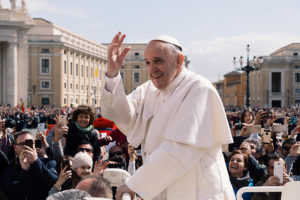Monochord or Polyphony: Latin America Has Enough Catholic Politicians Already
 Photo by Ashwin Vaswani on Unsplash
Photo by Ashwin Vaswani on Unsplash On March 4 Pope Francis spoke to a group of young Latin-American Catholics who had just completed a nine-day training seminar at the Vatican. Organized by the Pontifical Commission for Latin America, the intensive seminar centered on what the church teaches in regards to social doctrine and what the Vatican believes would make these young Catholics capable leaders outside the church.
The pope’s remarks were wide-ranging, but a central aspect was his conception of a Catholic view of politics and a Catholic’s role in politics. He declared, among many other things, that a “new presence of Catholics in politics is necessary in Latin America.”
Latin-American humanists were skeptical, to say the least. Catholics in Latin-American politics are responsible for many things: significant resistance to a bill in Argentina to legalize same-sex marriage (which ultimately failed to defeat it); battling to keep abortion outlawed in places like Honduras, even during the Zika outbreak; and leading the fight against adoption equality, to name a few. Of course, to call Catholics, including Catholic politicians, a monolith is unfair to many who are pro-choice and who view LGBTQ+ couples as deserving of equal rights, but when Pope Francis thinks of a Catholic politician, it’s not someone who espouses these more enlightened views. Fortunately, Pope Francis did say that Catholic politicians need not be his ideological match to be considered legitimate Catholic politicians, which is not a position that some other high profile Catholic leaders take. Some, including Honduran Cardinal Oscar Rodriguez Maradiaga, have previously said that any Catholic politician who supports pro-choice measures excommunicates.
In his address to the seminar attendees last week, Pope Francis invoked the mental image of Saint Oscar Romero, a legendary Salvadorian hero and Catholic archbishop who was murdered during the Salvadorian civil war and canonized in late 2018. He quoted the saint, specifically a letter that was signed by Romero and Bishop Rivera Damas on politics and the church (issued on August 6, 1978, the same day Pope Paul VI died). This letter spoke about political activity not limited to running for office and the need to look for appropriate political processes in which to engage.
The pope said to his audience that it was better to have a “polyphony in politics inspired by the same faith and built with multiple sounds and instruments, than a boring monochord melody apparently correct but homogenizing and neutralizing—and also static.” It’s a nice enough sounding statement if you don’t think too deeply about what it means to have politicians “inspired by the same faith” making legislation for everyone. That simply isn’t good for society in general and has the potential to be especially harmful for people not of the same faith as the legislators. Catholic politicians may work for Catholic people, depending on whatever small individual differences exist between their opinions and the opinions of their constituents, but other Christians, non-Christians, and the nonreligious should be wary about this notion of Catholic lawmakers.
It’s easy to view Latin America as a religious monolith, but this isn’t the case. Christians may have a solid majority throughout the region, much like they do in the United States, but they’re far from alone. And it’s not as if Catholics (who make up 70 percent of the region’s population) are members of the only church with any real influence. Protestants have been gaining ground in Latin America for decades (currently one-fifth of Latin Americans are Protestants). Significantly, the number of religiously unaffiliated Latin Americans has doubled in the past few decades to nearly 8 percent, according to the Pew Research Center. The remaining Latin-Americans who are not some shade of Christian or unaffiliated are believers, some of Abrahamic religions and some not.
Latin America has a rich tradition of religious diversity, and to say that it needs more Catholic politicians ignores that. Though unaffiliated and Protestant politicians exist (Uruguay’s former president Jose Mujica, for example, is an atheist), Latin America needs more, particularly unaffiliated politicians.
Hispanic and Latinx humanists in the United States who want to push back against this attempt to rally future Catholic politicians in Latin America can respond by sharing the works of secular organizations in Puerto Rico and other parts of Latin America. This can include the work of the Humanistas Seculares De Puerto Rico, the Ateistas de Puerto Rico, Humanistas Guatemala, Librepensamientos Honduras, Fundacion Sociedad Atea Chile, and many more. Humanistic and irreligious groups are surprisingly common in Latin America and each of them are doing unique things to push back against overt Christian (Catholic and otherwise) cultural dominance.
Secular groups in Latin America who want to push back against these efforts can share materials celebrating irreligious and other non-Catholic politicians, and they can encourage their members and people in their communities to run for office. Upcoming elections include: Panama’s general election on May 5, the Guatemalan general election on June 16, the Argentinian general election on the October 27, as well as general elections in Bolivia and Uruguay in October and a general election in the Dominican Republic in December. There’s also a range of smaller elections and referendums on various national and international issues as well.
